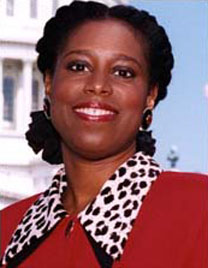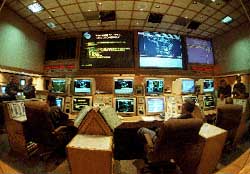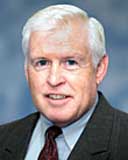The National Energy Policy Development Group - Energy Task Force
This falls under "What comes first, the chicken or the egg?"
Scalia says he's proud he didn't recuse himself in Cheney case

Source: wfsb.com
The West's Battle For Oil - The Energy Task Force
Document Says Oil Chiefs Met With Cheney Task Force
U.S. Court Dismisses Cheney Energy Task Force Case
May 2001 - The National Energy Policy Development Group
4/2/2006
HARTFORD, Conn. -- Conservative U.S. Supreme Court Justice Antonin Scalia had some advice Wednesday for those who questioned his impartiality after he refused to recuse himself from a case involving his hunting buddy, Vice President Dick Cheney.
"For Pete's sake, if you can't trust your Supreme Court justice more than that, get a life," Scalia said.
Scalia, addressing an audience at the University of Connecticut's law school on Wednesday, said recusing himself from the 2004 case _ which focused on an energy task force that Cheney led _ would only have given fuel to newspaper editorial writers and other detractors who have said he is too close to the vice president.
"I think the proudest thing I have done on the bench is not allowed myself to be chased off that case," Scalia said.
The case in question involved Cheney's request to keep private the details of closed-door White House strategy sessions that produced the administration's energy policy.
The administration fought a lawsuit brought by watchdog and environmental groups that contended that industry executives, including former Enron chairman Ken Lay, helped shape that policy. The Supreme Court upheld the administration position on a 7-2 vote.
Scalia refused to recuse himself from the case, rejecting arguments by critics who questioned his impartiality because of a hunting vacation that he took with Cheney while the case was pending.
Scalia told the audience Wednesday that he would have stepped aside had the case involved Cheney personally, but that he viewed it differently because the vice president was named in his official capacity as head of the group.
Scalia, 70, was appointed in 1982 by President Ronald Reagan to the U.S. Court of Appeals for the District of Columbia Circuit. Reagan nominated him four years later to the U.S. Supreme Court, filling the opening that occurred when William Rehnquist became chief justice.
Scalia takes a very literal approach to the Constitution, telling the audience Wednesday that he strongly disputes the idea that the wording selected by the Constitution's framers should be viewed in light of society's evolving morals and political leanings.
"You can't take the position that these words are expandable in one direction and not expandable in the other," he said. "They obviously meant to set some standards to control future generations."
He also said because of the Supreme Court's time constraints and heavy workload, justices often have to pass on the chance to review many potentially valid cases.
"I can't tell you how many cases I look at and say, 'Boy, they really messed that up,' " he said, then added a motion that pantomimed tossing something aside.
Several UConn law students who attended the speech said afterward that they were surprised by Scalia's candor, though none were surprised that he hewed to his well-documented conservative stances.
"He's definitely a very smart guy, very bright," said third-year law student Kay Williams of Rockville, Ind. "I think from his speech today, it seemed that while he has certain views, he's not looking to impose them on everyone else."
That opinion was not shared by protesters who set up tables and passed out pamphlets on the lawn near the building where Scalia spoke.
At a same-sex kissing booth near the lecture hall, students said they believe some of Scalia's opinions amount to attacks on gays, women and other minorities.
"His visit opened a lot of conversation on this campus," said third-year law student Colby Smith, who was wearing an "I Kiss Boys" T-shirt. "We want to make sure people understand what the concerns are with him, and why his views are particularly offensive."
This falls under "What comes first, the chicken or the egg?"
Scalia says he's proud he didn't recuse himself in Cheney case

Source: wfsb.com
The West's Battle For Oil - The Energy Task Force
Document Says Oil Chiefs Met With Cheney Task Force
U.S. Court Dismisses Cheney Energy Task Force Case
May 2001 - The National Energy Policy Development Group
4/2/2006
HARTFORD, Conn. -- Conservative U.S. Supreme Court Justice Antonin Scalia had some advice Wednesday for those who questioned his impartiality after he refused to recuse himself from a case involving his hunting buddy, Vice President Dick Cheney.
"For Pete's sake, if you can't trust your Supreme Court justice more than that, get a life," Scalia said.
Scalia, addressing an audience at the University of Connecticut's law school on Wednesday, said recusing himself from the 2004 case _ which focused on an energy task force that Cheney led _ would only have given fuel to newspaper editorial writers and other detractors who have said he is too close to the vice president.
"I think the proudest thing I have done on the bench is not allowed myself to be chased off that case," Scalia said.
The case in question involved Cheney's request to keep private the details of closed-door White House strategy sessions that produced the administration's energy policy.
The administration fought a lawsuit brought by watchdog and environmental groups that contended that industry executives, including former Enron chairman Ken Lay, helped shape that policy. The Supreme Court upheld the administration position on a 7-2 vote.
Scalia refused to recuse himself from the case, rejecting arguments by critics who questioned his impartiality because of a hunting vacation that he took with Cheney while the case was pending.
Scalia told the audience Wednesday that he would have stepped aside had the case involved Cheney personally, but that he viewed it differently because the vice president was named in his official capacity as head of the group.
Scalia, 70, was appointed in 1982 by President Ronald Reagan to the U.S. Court of Appeals for the District of Columbia Circuit. Reagan nominated him four years later to the U.S. Supreme Court, filling the opening that occurred when William Rehnquist became chief justice.
Scalia takes a very literal approach to the Constitution, telling the audience Wednesday that he strongly disputes the idea that the wording selected by the Constitution's framers should be viewed in light of society's evolving morals and political leanings.
"You can't take the position that these words are expandable in one direction and not expandable in the other," he said. "They obviously meant to set some standards to control future generations."
He also said because of the Supreme Court's time constraints and heavy workload, justices often have to pass on the chance to review many potentially valid cases.
"I can't tell you how many cases I look at and say, 'Boy, they really messed that up,' " he said, then added a motion that pantomimed tossing something aside.
Several UConn law students who attended the speech said afterward that they were surprised by Scalia's candor, though none were surprised that he hewed to his well-documented conservative stances.
"He's definitely a very smart guy, very bright," said third-year law student Kay Williams of Rockville, Ind. "I think from his speech today, it seemed that while he has certain views, he's not looking to impose them on everyone else."
That opinion was not shared by protesters who set up tables and passed out pamphlets on the lawn near the building where Scalia spoke.
At a same-sex kissing booth near the lecture hall, students said they believe some of Scalia's opinions amount to attacks on gays, women and other minorities.
"His visit opened a lot of conversation on this campus," said third-year law student Colby Smith, who was wearing an "I Kiss Boys" T-shirt. "We want to make sure people understand what the concerns are with him, and why his views are particularly offensive."











